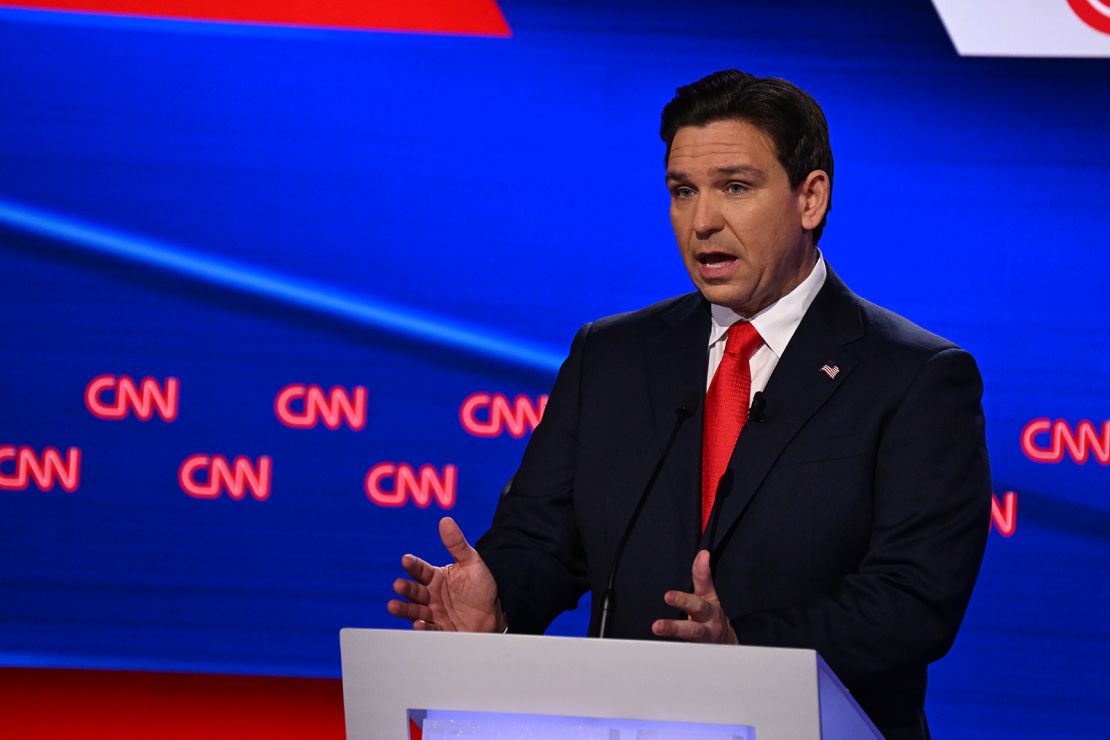Florida Gov. Ron DeSantis and former South Carolina Gov. Nikki Haley participated in CNN’s Republican presidential debate Wednesday as they looked to make their final appeals to Iowa voters just days before the state’s GOP caucuses.
While the Republican front-runner, former President Donald Trump, skipped the event, DeSantis and Haley took questions from likely GOP caucusgoers and CNN moderators Dana Bash and Jake Tapper on issues ranging from the economy to immigration.
Here is a fact check of some of the claims both candidates made on the debate stage.
DeSantis on Haley’s position on a gas tax
With the economy one of the key issues among voters, DeSantis aimed to position himself as the best candidate to address those concerns, claiming that Haley supported policies that hurt her constituents’ wallets, like raising the gas tax.
“Nikki Haley when she was governor she promised she would never do the gas tax, then tried to raise the gas tax on hardworking South Carolinians,” DeSantis said.
Facts First: This needs context. While Haley initially said that as governor she would not support an effort to raise the gas tax, she later said she would if it was paired with a cut to the state income tax.
In responding to DeSantis during Wednesday’s debate, Haley acknowledged as much, saying: “We said if you want to raise the gas tax, you have to reduce the income tax by five times that amount. They didn’t want to do it.”
It’s worth noting that this proposal was in response to state legislator’s efforts to raise the gas tax and did not constitute support for a standalone gas tax increase.
Furthermore, Haley’s proposal was not received favorably by the Republican-held state legislature and ultimately the gas tax remained the same during her tenure as governor. The gas tax was later raised under her successor, after South Carolina state legislators overrode a gubernatorial veto.
From CNN’s Tara Subramaniam. CNN’s Arit John contributed reporting.

Haley on immigration from Central America
Haley claimed during Wednesday night’s CNN GOP debate that while at the United Nations, she stopped the flow of migration from certain parts of Central America.
Haley recalled a previous trip to Honduras and Guatemala, saying, “We had our military go and train them on how to deal with gangs.”
“We went and put drug boats on the water to keep the drugs from coming. But we said you have to have them processed from here. You can’t have them come. We were able to stop that flow,” Haley said.
Facts First: It’s unclear what operation Haley was referring to, though the United States does have a presence in Central American countries and often works in partnership with those countries to stem the flow of migration. While migration from different regions ebbs and flows, it hasn’t altogether stopped from Honduras and Guatemala.
In fiscal year 2023, border authorities encountered 433,771 migrants from Guatemala and Honduras at the US southern border, according to US Customs and Border Protection data.
From CNN’s Priscilla Alvarez
DeSantis on Biden’s immigration policy
DeSantis said Wednesday that President Joe Biden has “let” 8 million migrants into the country through the US-Mexico border.
“Biden has let in 8 million people just in four years,” DeSantis said.
Fact check: That is not true. US Customs and Border Protection has released more than 2.3 million migrants into the United States under the Biden administration, according to federal data, though it’s still less than the more than 6 million migrants border authorities took into CBP custody in that same period – many of whom are then removed from the country.
According to the Department of Homeland Security, the majority of all southwest border migrant encounters under the Biden administration have been removed, returned or expelled.
The Biden administration has grappled with record migration across the Western hemisphere and thousands of migrant arrivals at the US-Mexico border. Migrants have been released in the United States, depending on several factors, while they go through immigration proceedings, while others have been removed.
From CNN’s Priscilla Alvarez
Haley on the Biden administration’s immigration policy
Haley said during CNN’s GOP debate on Wednesday that the Biden administration’s expansion of Temporary Protected Status to Venezuelans furthered the immigration crisis, saying “all that does is incentivize them to pick up the phone and call their family members and tell them to come.”
Facts First: It’s true that the Biden administration expanded a form of humanitarian relief – known as Temporary Protected Status – to Venezuelans already in the United States, though it’s unclear whether it served as an incentive.
Last year, the Department of Homeland Security announced that Secretary Alejandro Mayorkas was extending and redesignating Venezuela for TPS for 18 months for individuals who were residing in the US on or before July 31. DHS anticipated around 472,000 Venezuelans would be newly eligible for the status.
It’s hard to determine what does and doesn’t incentivize migrants to come to the United States. Homeland Security officials have said that word-of-mouth often encourages migration, but that misinformation also plays a role. TPS only applies to migrants already in the US.
From CNN’s Priscilla Alvarez
DeSantis on aid to Ukraine
DeSantis argued against further US funding for Ukraine by saying that “tens of billions of dollars” have been used “to pay salaries for Ukrainian government bureaucrats,” and that US taxpayers have “paid pensions for Ukrainian retirees.”
Facts First: This needs context.
Although the US has provided Ukraine with around $23 billion in direct budget support since the start of the Russian invasion in February 2022, it cannot be said that all of that funding is going to “bureaucrats” or “pensions.”
The money, which is disbursed through the World Bank, has gone to pay “wages for hospital workers, government employees, and teachers as well as social assistance for the elderly and vulnerable,” according to a statement from Treasury Secretary Janet Yellen. It has also been provided to the Ukrainian government to “supply emergency services for internally displaced persons,” the US Agency for International Development said in February of last year.
From CNN’s Jennifer Hansler

DeSantis on Biden helping evacuate Americans from Israel
In response to a question about Israel, DeSantis said that Florida rescued Americans from the country in the wake of Hamas’ October 7 attack because “Biden wasn’t helping Americans get out of the war zone.”
Facts First: DeSantis’s claim is false. The Biden administration helped Americans evacuate from Israel after the attack.
The US government did charter flights for Americans seeking to leave Israel, with the first flight taking place on October 13. The State Department stopped the flights by the end of October due to lack of demand, signaling that the program was successful at helping the Americans who wanted to leave.
DeSantis argued that the federal government didn’t do enough, which is why he organized flights from Israel to Florida for Americans looking to return home. But his flights only began after the State Department-led evacuations had started.
CNN previously fact-checked a similar claim that DeSantis made at a CNN town hall in December.
From CNN’s Marshall Cohen and Haley Britzky
DeSantis on Americans’ mortgage payments rising
DeSantis speculated that Americans’ monthly mortgage payments are “probably” double what they would have been if they bought a home five years ago.
Facts First: The “probably” is an appropriate couch here from the governor, who is mostly accurate on this claim.
In 2019, the median monthly mortgage payment was $1,242, when factoring an average mortgage rate of 4.13% into a $320,250 median priced home, according to Bankrate citing US Census Bureau data. Right before the end of 2023, the median monthly mortgage payment was estimated at $2,361, according to Redfin. By those estimates, the median monthly mortgage payment is about 90% higher today than in 2019.
Mortgage rates have been on a rollercoaster ride during the past few years. In January 2019, the average 30-year fixed-rate mortgage was 4.45%, according to the Federal Reserve Bank of St. Louis, citing Freddie Mac data. Rates plunged to historic lows right before and during the Covid-19 pandemic, falling as low as 2.65% in January 2021.
Rates spiked after March 2022, when the Federal Reserve began its historic inflation-curbing campaign of dramatic monetary policy tightening. Average mortgage rates surpassed 7% in August and ultimately peaked at 7.79% in October. As of last week, they were 6.62%.
Beyond rates, there are a number of factors (including taxes and insurance) that influence a monthly mortgage payment.
From CNN’s Alicia Wallace

Haley on DeSantis’ energy record
Haley and DeSantis once again had a back-and-forth on fracking and off-shore oil drilling during CNN’s GOP debate Wednesday night. The former South Carolina governor once again claimed DeSantis “banned fracking” on his second day in office. Haley also accused DeSantis of writing a bill that would have reversed the Renewable Fuel Standard, which blends corn-based ethanol (a big Iowa export) with gasoline.
“Why did he run on the fact that he wanted to ban fracking and ban offshore drilling? Why did he go and author that legislation to eliminate the renewable fuel standard that matters so much?” Haley said.
DeSantis accused Haley of “beating that dead horse.”
Facts First: Haley is largely right. DeSantis has previously suggested his ban on off-shore drilling as Florida governor came from a state constitutional amendment. DeSantis did not unilaterally ban fracking before the constitutional amendment passed, but an executive order he signed just days after taking office as governor of Florida called for the state to “adamantly oppose all off-shore oil and gas activities off every coast in Florida and hydraulic fracturing in Florida.” As a member of congress, DeSantis also co-sponsored a bill to repeal the Renewable Fuel Standard.
Haley’s broader argument about DeSantis’ position on off-shore drilling and fracking is supported by his past comments and actions. During DeSantis’ 2018 gubernatorial campaign, he was asked if he supported a ban on fracking and he emphatically said yes. In January 2020, he also oversaw the purchase of 20,000 acres of Everglades wetlands by the state of Florida to permanently protect them from oil drilling, which wasn’t prompted by the constitutional amendment in any way.
From CNN’s Ella Nilsen and Tara Subramaniam
DeSantis on Iranian sanctions
DeSantis suggested that Biden eased sanctions on Iran, which gave them access to money used to fund terrorism.
“The root of this is Biden came into office, and he relaxed the sanctions on Iran. They’ve had massive amounts of money flooding into their country, just like under the Obama administration. They take that money, and they use it to fund jihad around the world,” DeSantis said.
Facts First: This is partly false and needs context.
The Biden administration has lifted a handful of Iranian sanctions, which they said were removed because of “verified change in status or behavior.” However, Biden has also retained and imposed numerous other sanctions on Iran. The Biden administration has issued waivers to allow Iraq to purchase electricity from Iran – something the Trump administration did as well.
Iran has been faced with a significant economic crisis for years, in large part due to the crippling US sanctions that were imposed under the Trump administration.
According to the IMF, Iran’s GDP has grown since 2020, but so has its inflation rate. A November 2022 report from the US Energy Information Administration noted that “although sanctions on its oil exports remained in place, Iran shipped more crude oil, primarily to China, in 2021” than the year prior, in part due to the Covid-19 pandemic. “In 2021, Iran’s oil companies earned about $40 billion in net oil export revenues, up from around $15 billion in 2020,” the report said.
From CNN’s Jennifer Hansler
Haley’s math comparing clean energy tax credits to national security
Making a point about spending on national security, Haley said that the US supporting Ukraine, Israel and securing the southern border would cost “less than 20% of Biden’s green subsidies.”
Facts First: This math from Haley is largely true.
The cost of the clean energy tax credits in the Inflation Reduction Act was initially estimated at $391 billion over ten years, but a more recent estimate from the federal Congressional Budget Office and Joint Committee on Taxation estimated the cost of these tax credits has risen to around $570 billion over the next decade. That’s largely a reflection of how popular these subsidies are, as consumers take advantage of tax credits for EVs, energy-efficient appliances, and companies seek to gain tax breaks for investing in renewables, clean hydrogen, and new manufacturing.
If you compare that price-tag to the $106 billion proposal the Biden administration has put forward to fund Ukraine, Israel, and boost border security, that is less than 20% of the decade-long clean energy tax credits. However, Haley’s math gets shaky if you add the $111 billion the US has already spent on supporting Ukraine.
From CNN’s Ella Nilsen
DeSantis on life expectancy and Social Security
Asked about the need to reform Social Security, DeSantis said he would not raise the retirement age at a time when life expectancy is on the decline.
“I don’t see how you can raise the retirement age when our life expectancy is collapsing in this country,” DeSantis said. “I would never raise the retirement age in the face of declining life expectancy.”
Facts First: It’s true that life expectancy suffered historic drops during the first two years of the Covid-19 pandemic, but DeSantis’ claim needs context. Life expectancy started to rebound in 2022, according to the US Centers for Disease Control and Prevention.
In 2022, life expectancy at birth rose by 1.1 years to 77.5 years, according to provisional CDC data. But it’s still lower than it’s been in roughly 20 years. The recent increase offset less than half of the 2.4 years of life lost in the first two years of the pandemic.
A decline in mortality from Covid-19 was a main reason why life expectancy rose in 2022. About 245,000 people died from Covid-19 in 2022, down from more than 462,000 deaths in 2021 and from about 385,000 deaths in 2020, according to CDC data.
From CNN’s Tami Luhby and Deidre McPhillips

DeSantis and Haley on Biden’s electric vehicle policies
DeSantis and Haley both characterized Biden’s policies on electric vehicles as mandatory for American drivers.
DeSantis said Biden wants to “mandate electric vehicles,” and Haley said Biden’s policies would “have everybody drive an electric car by 2035,” adding, “that’s not even smart.”
Facts First: DeSantis and Haley’s claims are misleading. Biden has not moved forward with EV mandates, though his administration has made an aggressive push for automakers and consumers to move toward electric vehicles.
The Biden administration has proposed ambitious new tailpipe emissions regulations for automakers, offered tax credits to people who buy certain electric vehicles, invested in new electric vehicle charging stations and ordered federal entities to purchase electric vehicles, among other policies promoting the adoption of EVs. But there is no Biden requirement mandating the use of electric vehicles and no Biden proposal to prohibit citizens from continuing to use gasoline-powered engines as more EVs hit the roads.
Depending on how automakers were to respond, the Environmental Protection Agency’s proposed new tailpipe rules could, if adopted, require electric vehicles to make up two-thirds of new cars sold in the US by 2032. Several blue states, including California, have passed laws banning the sale of new gas-powered vehicles by 2035.
From CNN’s Ella Nilsen
Haley on Social Security cost of living adjustments
Asked how she would reform Social Security, Haley gave a couple of options, including changing how the annual benefit increase is calculated.
“Instead of cost-of-living increases, we do increases based on inflation,” she said.
Facts First: Haley’s statement is misleading. Social Security’s cost of living adjustments are already based on inflation. The annual boosts are intended to help senior citizens and other beneficiaries contend with the annual change in prices.
The formula for determining annual adjustments is specified in the Social Security Act. The adjustments are based on increases in a certain inflation index, the Consumer Price Index for Urban Wage Earners and Clerical Workers, known as CPI-W. It aims to take into account the annual increase in prices.
The annual boost, however, actually hasn’t kept pace with inflation over time. Those who retired before 2000 have seen the purchasing power of their benefits drop by 36%, according to The Senior Citizens League.
From CNN’s Tami Luhby
DeSantis on anti-transgender bathroom bills
DeSantis claimed that Haley opposed a bill in her state while governor that would have banned people from using public bathrooms that didn’t correspond to the sex listed on their birth certificate.
“She just said she’s always fought to protect kids but when she was governor of South Carolina, they had a bill to protect girls from men going into the bathroom. She killed it and she’s bragged about it for years that that happened,” DeSantis said.
Facts First: DeSantis’ attack left out critical context about himself. He correctly described Haley’s stance on a proposed anti-transgender bathroom bill while she was governor of South Carolina in 2016 – but he didn’t mention that he also took a hands-off position on bathroom policy while running for governor of Florida two years later.
In 2016, a Republican legislator in South Carolina introduced a bill that proposed to require people to use public bathrooms corresponding to their “biological sex.” The legislator made the proposal during a national controversy over a similar bill that had recently been signed into law in North Carolina; numerous businesses had announced that they were canceling planned investments and events in North Carolina due to the legislation.
In response to the South Carolina proposal, Haley said “I don’t believe it’s necessary.” She said she was not aware of “one instance” of bathroom-related problems in the state, and she said, “We’re not hearing of anybody’s religious liberties that are being violated, and we’re again not hearing any citizens that are being violated in terms of freedoms.”
Last year, DeSantis signed a Florida law that prohibits transgender people from using bathrooms corresponding to their gender identity while in government buildings, such as public schools, prisons and universities. While running for governor in 2018, however, DeSantis was dismissive of the idea of state bathroom legislation – saying, at a Republican primary forum hosted by a Christian conservative organization, that “getting into the bathroom wars, I don’t think that’s a good use of our time” and that people should be able to set up bathrooms “how they want.”
“I would not pass a law; I would leave it as it is and stay out of that,” he said.
It’s fair to note that DeSantis was speaking in 2018 during a discussion about how the candidates would respond to a proposal allowing someone to use the bathroom of their choice. Still, his comments conveyed opposition to Florida’s state government getting involved in the matter – two years after Haley expressed opposition to South Carolina’s state government getting involved in the matter.
From CNN’s Kaanita Iyer and Daniel Dale
Haley on protests in South Carolina following racial shootings in 2015
Responding to Florida Gov. Ron DeSantis’ claim about her support for Black Lives Matter and a question about crime, former South Carolina Gov. Nikki Haley said there were no protests in South Carolina after two deadly racial shootings in 2015 – the police killing of Walter Scott and the massacre at a historic Charleston church.
“We had the shooting of Walter Scott. … We had a horrific shooting at a church where a White supremacist came in and killed nine amazing souls. BLM, all of that, we never had to deal with riots. We’ve never had to call in the National Guard, Ron, because when we had both of those shootings, we were able to pull people together. We didn’t have riots. We had vigils. We didn’t have protests. We had prayer. We brought people together,” Haley said. “Not only did I move to bring the Confederate flag down, we came together as a state of prayer and we had no division, no riots, no anything.”
Facts First: While Haley is correct that there were prayer services and vigils after both shootings and there were no widely reported riots, there were also protests at the time.
Civil rights groups and activists held rallies and protests after both shootings. Following the killing of Walter Scott, an unarmed Black man who was shot in the back by a White police officer, activists called for police reform, including for body cameras to be worn by officers.
There were protests and renewed calls for the removal of the Confederate flag at the state house after the killing of nine Black people at Mother Emanuel AME Church in June 2015. Haley supported the removal of the Confederate flag then while serving as governor. An activist was also arrested for climbing a flagpole on the grounds of the South Carolina state Capitol and removing the Confederate flag.
From CNN’s Chandelis Duster




